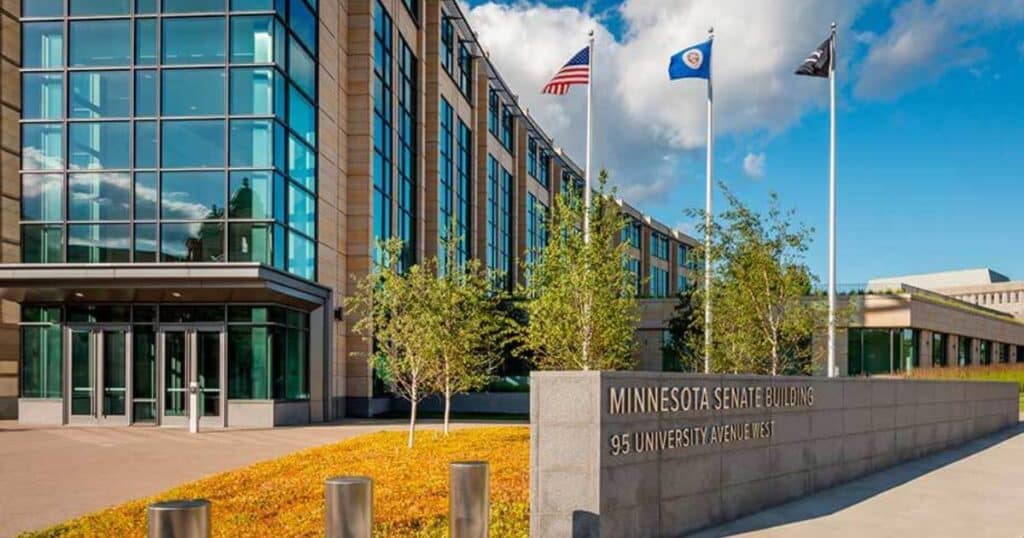Minnesota senators in a key committee have made inroads for Minnesota marijuana laws. The group is the latest ensemble to consider the reform along its journey to marijuana legalization.
The Senate Judiciary and Public Safety Committee was the first panel in the chamber to consider the bill from Sen. Lindsey Port in January. On Friday, members went back to the drawing board, approving a number of amendments to Minnesota marijuana laws, including voting to send it to the next committee without recommendation.
This comes from significant progress made by Minnesota lawmakers who recently took up a bill to create a psychedelics task force to plan for legalization. So overall, an eventful week in the fight for marijuana legalization in the North Star State. This kind of mobility will undoubtedly have major knock-on effects on the legal trajectory in congressional battles to come. This article unpacks what all of this means for cannabis legalization and decriminalization.
The Numbers at Play in the Minnesota Marijuana Bill
So far, a total of ten Senate committees have officially accepted the measure, with a House companion version from Republican Zack Stephenson clearing 13 committees in the chamber so far.
Sen. Port believes that the “prohibition of cannabis is a failed system that has not achieved the desired goals,” shedding light on the major costs faced by communities of color in particular.
Port further enthused that the bill offers a means of remedial action to undo the effects of an unfair system, with cannabis regulations that are tailor-made for Minnesota consumers and retailers–creating new market opportunities for communities that were disadvantaged under the prohibition.
“Our main goals are to legalize, regulate and expunge—and we are working to ensure that this bill does just that,” Port said.
What the Minnesota Marijuana Bill Says
With both versions amended numerous times throughout the legislative process, a Senate panel adopted a comprehensive substitute from the sponsor at a committee stop which was primarily meant to address concerns from industry stakeholders operating under a marijuana law enacted last year which legalized low-THC edibles in Minnesota.
The amendments would approve two new licensing categories—alter license application and transfer provisions—thus providing cities and counties with more regulatory control through the use of more concise language in the bills.
Democratic-Farmer-Labor officials are confident that cannabis legalization will be enacted shortly following the extensive committee deliberation.
Gov. Tim Walz also recently released his biennial budget request, which includes proposed funding for the implementation of cannabis legalization and expungements. The budget also made projections about the millions in marijuana tax revenue that his office projects the state will earn upon enactment of the reform.
Amendments Galore
To date, amendments to expungements surpass several parameters, including dates effective, who is eligible for expungement, altering of language in legislation, and who they apply to or disregard.
What the Psychedelic Task Force Means for Minnesota
Fresh on the back of the news of the marijuana legalization bill, a Minnesota House committee recently adopted a bill to establish a task force that will study and advise on the potential legalization of psychedelics like psilocybin, MDMA, as well as ibogaine.
Since lawmakers in the state are currently engaged in measures to legalize cannabis, the House Health Finance and Policy Committee paused further action on the psychedelics reform bill from Rep. Andy Smith (D).
The idea with the pause is to hold it over in committee to possibly be incorporated into broad-based omnibus health legislation that is currently in the works. Smith further cited the many scientifically proven benefits of psychedelics on an array of psychological disorders as further validation for the force’s establishment.
Under the bill, a Psychedelic Medicine Task Force will be established to serve an advisory role to the legislature on legal, medical, as well as policy issues linked to the legalization of psychedelic medicine in Minnesota.

The Psychedelic Task Force Unpacked
The 23-member task force will consist of officials and cannabis experts, including the governor or a designee, public health policy experts, the health commissioner, the state attorney general or a designee, people with expertise in substance misuse treatment, two tribal representatives, as well as military veterans with mental health conditions among others.
The proposal stipulated that the House majority leader and Senate majority leader would each get to appoint two task force members, with the committee adopting an amendment that would let the minority leaders of both chambers each have one of the appointments.
Members of the task force will be required to evaluate existing scientific studies regarding the therapeutic effect of psychedelic medicine when it comes to treating mental health conditions like depression, anxiety, and bipolar and post-traumatic stress disorder, together with other conditions for which psychedelic treatments may prove effective, the bill text stipulates.
Undoubtedly, the two measures will work hand in hand to effect tremendous reform in the endeavor of favorable Minnesota marijuana laws. On one end, lawmakers are working hard for expungement, and on the other, they are making headway to approve medical marijuana as a treatment for psychological disorders. From both the legal and personhood perspective, these measures make for a hopeful Minnesota public.
Enjoyed that first hit? Come chill with us every week at the Friday Sesh for a freshly packed bowl of the week’s best cannabis news!
















